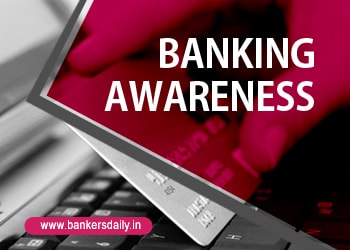Banking Awareness Quiz – 95
Want to Become a Bank, Central / State Govt Officer in 2020?
Join the Most awarded Coaching Institute & Get your Dream Job


Now Prepare for Bank, SSC Exams from Home. Join Online Coure @ lowest fee
Lifetime validity Bank Exam Coaching | Bank PO / Clerk Coaching | Bank SO Exam Coaching | All-in-One SSC Exam Coaching | RRB Railway Exam Coaching | TNPSC Exam Coaching | KPSC Exam Coaching
Banking Awareness Quiz – 95
1. On which one of the following issues can SEBI penalize any company in India?
(A) Violation of Banking Regulation Act.
(B) Violation of foreign portfolio investment guidelines.
(C) For violation of Negotiable Instrument Act.
(a) Only A
(b) All (A), (B) & (C)
(c) Only (A) & (B)
(d) Only (B) & (C)
(e) Only (B)
2. Expand the term FSDC which is used in financial sectors?
(a) Financial Security and Development Council
(b) Financial Stability and Development Council
(c) Fiscal Security and Development Council
(d) Fiscal Stability and Development Council
(e) None of the above
3. For which one of the following reasons are Basel II norms to be followed by Commercial banks?
(a) Risk Management
(b) Adoption of international accounting standards
(c) Restrictions on bonus payments to bank executives
(d) Transparency in disclosures
(e) None of the above
4. The Securities and Exchange Board of India (SEBI) and the Reserve Bank of India have given guidelines to enable trading in currency derivatives on stock exchanges. Which of the following statements is/are TRUE in this context?
(A) Any bank is eligible to become a clearing member and/ or a trading member of the currency derivatives segment of an exchange
(B) The last day for trading of the contact shall be two working days prior to the fiscal settlement day.
(C) Currency features are permitted now only in U. S. dollar-Indian Rupee (a) Only A
(b) Only C
(c) Both A&B
(d) All A, B&C
(e) None of these
5. When a loan is granted by bank for purchase of white goods it is called
(a) Consumption loan
(b) White goods loan
(c) Consumer durable loan
(c) All of these
(d) None of these
6. As per the reports in various newspapers many private companies are trying to obtain the licences to launch a banking company in India. Which of the following organizations/agencies issue the licence for the same?
(a) Securities and Exchange Board of India (SEBI)
(b) Indian Institute of Banking and Finance (IIBF)
(c) Indian Bank Associations
(d) Registrar of Companies
(e) None of the above
7. The main function of IMF is to
(a) give financial investment loans to developing countries.
(b) acts as a private sector lending arm of the World Bank.
(c) help to solve balance of payment problems of member countries.
(d) Arrange international deposits from banks.
(e) None of the above
8. The rate of interest on savings bank account is stipulated by
(a) the concerned bank
(b) RBI
(c) Indian banks association
(d) Government of India
(e) Banking codes and standards board of India
9. The RBI reviews its credit and monetary policy at regular intervals and also in between. What is the purpose of the same?
(A) To ensure the inflation does not cross limits.
(B) To ensure that banks have enough liquidity.
(C) To ensure that cost of the fund does not reach a very high level.
(a) Only A
(b) Only B
(c) All A, B&C
(c) Only B&C
(e) None of these
10. What is hot money?
(a) Money which has tendency to migrate towards highprofit-oriented places.
(b) Money which has tendency to migrate towards lowprofit-oriented places.
(c) Money, which has no interest.
(d) Only a&b
(e) Only a&c




2 comments
8.RBI
Correct answer updated.